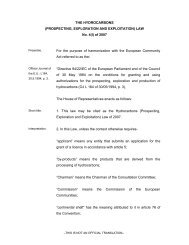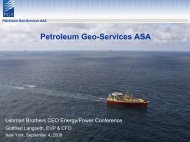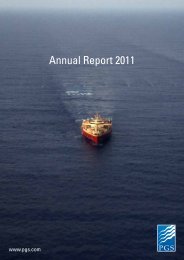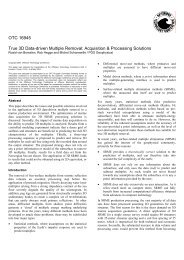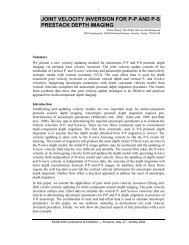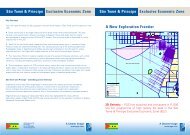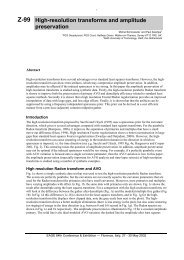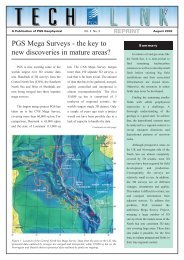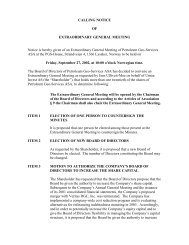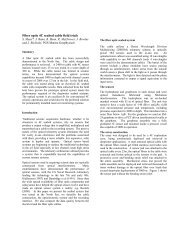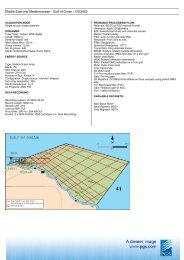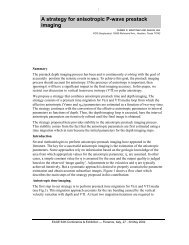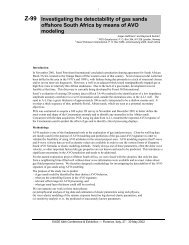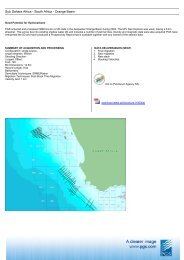Arrow Prospectus - PGS
Arrow Prospectus - PGS
Arrow Prospectus - PGS
You also want an ePaper? Increase the reach of your titles
YUMPU automatically turns print PDFs into web optimized ePapers that Google loves.
ARROW SEISMIC ASA – INITIAL PUBLIC OFFERING<br />
Qualification and entry<br />
There are numerous qualifying conditions which must be met in order to enter into the UK tonnage tax regime.<br />
A qualifying company or group must elect in order for the regime to apply. This election generally has effect for<br />
10 years, unless a company or group ceases to qualify for the tonnage tax regime.<br />
Elections can be made by qualifying companies, within 12 months of becoming a qualifying company and in<br />
other specific circumstances.<br />
To benefit from the regime a company must be subject to corporate income tax in the UK and operate qualifying<br />
ships which are strategically and commercially managed in the UK. A group qualifies if one or more members<br />
are qualifying companies. There are restrictions on the percentage of ships that may be time-chartered in and<br />
other anti-avoidance provisions.<br />
Training requirement<br />
Companies are eligible for tonnage tax benefits only if they meet the minimum training obligation. According to<br />
the size of the fleet and number of officers employed the company have an obligation to train a specified number<br />
of officers.<br />
The tonnage tax company’s training plan must be approved before HMRC will permit entrance into the tonnage<br />
tax regime. These plans then need to be submitted annually, in order to maintain tonnage tax status.<br />
Method of calculation<br />
A company or group of companies in relation to which a tonnage tax election has effect is a Tonnage Tax<br />
Company (‘TTC’) or Tonnage Tax Group (‘TTG’). For the purposes of corporate income tax, a TTC’s relevant<br />
shipping profits (‘RSP’) are replaced by tonnage tax profits (‘TTP’).<br />
TTP is calculated by reference to the qualifying daily net tonnage of each ship operated by a TTC. The net<br />
tonnage is multiplied by:<br />
−<br />
−<br />
−<br />
−<br />
£0.60 per 100 tons to 1,000 tons<br />
£0.45 per 100 tons between 1,000 tons and 10,000 tons<br />
£0.30 per 100 tons between 10,000 tons and 25,000 tons<br />
£0.15 per 100 tons above 25,000 tons<br />
The TTP is the aggregate of the calculations for each ship. The normal corporation tax rate of 30% (likely to be<br />
28% in 2008) is then applied to the TTP.<br />
The relevant shipping profits are made up of four different elements:<br />
1) Income from operating qualifying ships, but excluding certain income, for example income from<br />
exploratory operations on the UK continental shelf and certain bareboat chartering income.<br />
2) Dividends received from non-UK shipping companies which would qualify for UK tonnage tax if they<br />
were UK resident and subject to UK corporation tax.<br />
3) Interest, foreign exchange gains/losses and profits on interest rate and currency contracts which are so<br />
closely related to core tonnage tax activities that they are not treated as investment income; and<br />
4) Gains arising on the disposal of assets used for the tonnage tax trade.<br />
76



